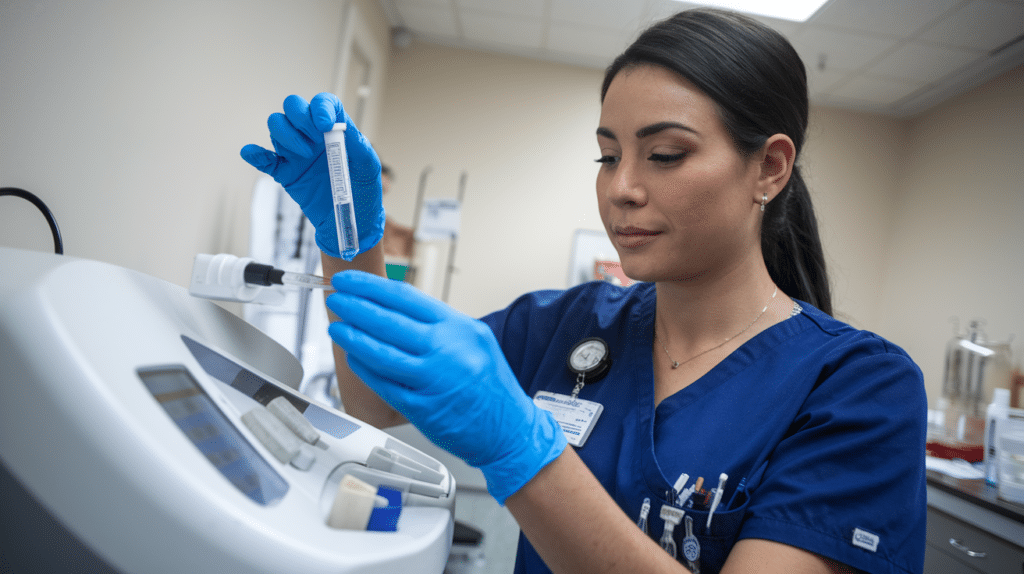If you want to start a career as a Medical Assistant, you should try to develop the top skills that are mostly required for the smooth operation of medical facilities.
If you’re already a Medical Assistant and are struggling to get interview calls, it might be because your resume isn’t showcasing your abilities effectively.
Remember, your resume is the key to telling potential employers why you’re the right fit for the job.
So, in this article, we’ll discuss what skills you should actually put in your resume, which could not only help you get calls for interviews but also boost your chances of getting that job.
Well, let’s get started.

Types of Skills of a Medical Assistant
Medical assistants play a vital role in healthcare settings by performing a wide variety of tasks.
Their responsibilities require a diverse skill set that includes:
- Clinical Skills
- Administrative Skills
- Soft Skills
These skills ensure smooth operations in clinics, hospitals, and physicians’ offices and contribute to effective patient care.
Clinical Skills for Medical Assistants
Clinical medical assistants work closely with physicians and other healthcare professionals, directly supporting patient care.
Their clinical skills include taking vital signs, administering injections, drawing blood, assisting in minor surgeries, and updating patient medical records.
They must also be proficient in using medical equipment and ensuring patient comfort.
Administrative Skills
Administrative medical assistants handle the front-office tasks that keep a medical practice running smoothly.
They manage patient appointments, handle billing and insurance claims, maintain patient records, and answer phones.
Strong organizational skills are essential for keeping operations efficient, while familiarity with healthcare software is crucial for managing records electronically.
Soft Skills
Soft skills are just as important for medical assistants. These include effective communication, empathy, problem-solving abilities, and attention to detail.
Medical assistants often serve as a bridge between patients and healthcare providers, so clear and compassionate communication is key to ensuring patients feel supported and informed.
Top 6 Clinical Skills For Your Resume
Medical assistants need strong clinical skills to support physicians and ensure patient care runs smoothly.
These skills go beyond basic tasks and require a precise understanding of healthcare procedures.
Let’s explore some of the top clinical skills, including how they’re performed and real-life examples of their application.
#1 Taking Vital Signs
Taking vital signs is one of the core responsibilities of a medical assistant. This includes measuring a patient’s blood pressure, heart rate, temperature, and respiratory rate.
To perform this, medical assistants use tools such as a sphygmomanometer for blood pressure or a thermometer for body temperature.
For example, during a routine check-up, a medical assistant may take a patient’s vital signs to ensure they’re within a normal range before the physician examines them.
#2 Administering Injections
Medical assistants often give patients injections, such as vaccines or medications.
This requires knowledge of injection techniques, sterile practices, and the correct administration method (intramuscular, subcutaneous, etc.).
For instance, a medical assistant might administer a flu shot, ensuring the injection is delivered accurately while maintaining hygiene to avoid infections.
#3 Phlebotomy (Drawing Blood)
Phlebotomy involves drawing blood samples from patients for testing.
To do this correctly, a medical assistant must locate veins, apply a tourniquet, and use sterile needles to collect the sample.
In practice, a medical assistant may draw blood for routine lab tests, ensuring proper labeling and handling to avoid contamination.
#4 Wound Care and Dressing
Medical assistants assist in wound care, cleaning, and dressing. This involves applying antiseptics, bandaging wounds, and monitoring healing.
For example, after a minor procedure, a medical assistant might clean the wound and apply a sterile dressing to protect it from infection while educating the patient on at-home care.
#5 Electrocardiogram (EKG) Administration
Medical assistants often perform EKGs to check heart function. This involves attaching electrodes to the patient’s chest and limbs to monitor electrical activity.
An example would be running an EKG on a patient experiencing chest pain to help diagnose potential heart issues.
#6 Assisting in Minor Surgeries
Medical assistants provide crucial support during minor surgeries by preparing instruments, maintaining sterility, and assisting the physician during the procedure.
For example, during a mole removal, the medical assistant ensures all tools are sterile, hands instruments to the doctor, and helps clean up post-operation.
Read -> Top 7 Medical Assistant Skills You Need
Top 5 Administrative Skills For Your Resume
In addition to clinical tasks, medical assistants play a vital role in handling administrative duties that keep healthcare facilities organized and running smoothly.
These administrative skills involve managing patient records, scheduling, and insurance claims, all while providing excellent customer service.
Let’s explore key administrative skills and how they are carried out, with examples.
#1 Managing Patient Records
Maintaining accurate and updated patient records is a fundamental administrative task.
Medical assistants ensure that personal and medical information is recorded properly in the electronic health records (EHR) system.
For instance, when a new patient visits, the medical assistant inputs their medical history, medications, and insurance information into the system, ensuring it’s available for the healthcare provider’s review.
#2 Scheduling Appointments
Scheduling appointments efficiently is another key responsibility.
Medical assistants use practice management software to book, reschedule, or cancel appointments. They must coordinate physician availability with patient needs.
For example, a medical assistant might book a follow-up appointment after a procedure while considering both the patient’s convenience and the doctor’s schedule.
#3 Processing Insurance Claims
Medical assistants are often responsible for verifying insurance coverage and processing claims.
This involves checking patient eligibility, preparing claim forms, and submitting them to insurance companies.
An example of this skill in action is when a medical assistant reviews a patient’s insurance policy before a procedure to ensure coverage and help the patient understand their financial responsibility.
#4 Answering Phones and Communicating with Patients
Good communication skills are essential when managing phone calls and interacting with patients.
Medical assistants often handle phone inquiries, give appointment reminders, and relay messages between patients and healthcare providers.
For example, they might answer questions about lab results or provide instructions on how to prepare for an upcoming test.
#5 Medical Billing and Coding
Medical assistants are responsible for coding medical procedures and diagnoses for billing purposes.
Using codes from the ICD-10 or CPT manuals, they ensure that services are billed correctly.
For instance, after a patient’s visit, a medical assistant assigns the appropriate codes for services rendered, ensuring the claim is processed accurately by insurance.
You May Also Like -> What does a Medical Assistant Do?
Top 5 Soft Skills For Your Resume

Soft skills are essential for medical assistants to succeed in their roles. These interpersonal skills help medical assistants interact effectively with patients, colleagues, and healthcare providers.
Unlike technical skills, soft skills are more about communication, empathy, and adaptability.
Here’s a look at the critical soft skills medical assistants need, with examples of how they can be applied.
#1 Communication Skills
Strong communication skills are crucial for medical assistants to interact clearly with patients and healthcare professionals. This includes both verbal and written communication.
For example, when explaining a medical procedure, a medical assistant must use simple language that a patient can easily understand.
They also need to accurately document patient information and relay instructions between doctors and patients without errors.
#2 Empathy
Empathy allows medical assistants to connect with patients on an emotional level, helping to alleviate anxiety and make patients feel more comfortable.
For instance, when a patient is nervous about a medical test, an empathetic medical assistant might reassure them by explaining the procedure in a calm, understanding manner, making them feel at ease.
#3 Time Management
Medical assistants must manage their time effectively to handle multiple tasks throughout the day, from patient check-ins to administrative duties.
For example, during a busy day, a medical assistant might have to balance attending to patients in the waiting room while ensuring that documentation is up-to-date for upcoming appointments.
Good time management allows them to handle this workload efficiently without compromising the quality of care.
#4 Problem-Solving
Problem-solving skills are important when unexpected challenges arise. Medical assistants often need to think on their feet.
For example, if a patient’s insurance information is outdated, a medical assistant may need to quickly contact the insurance provider to resolve the issue before the patient’s appointment, ensuring that their visit goes smoothly.
#5 Adaptability
In a healthcare environment, things can change quickly, and medical assistants must be adaptable to handle those changes.
For instance, if a doctor’s schedule changes suddenly or if there’s an emergency, a medical assistant must adjust their tasks without getting overwhelmed, ensuring that patient care remains seamless.
You May Also Like -> A Day In The Life as a Medical Assistant
The Best 3 Ways To Develop Skills of a Medical Assistant
Employers look for well-rounded candidates, and having proficiency in clinical, administrative, and soft skills will set you apart in the healthcare field.
Furthermore, well-developed skills can lead to job promotions, higher salaries, and a more rewarding work experience.
Here are the three key methods to help you develop these vital skills and enhance your career opportunities:
#1 Enrolling in a Formal Training Program
One of the most effective ways to develop the required skills for a Medical Assistant role is by enrolling in a formal training program.
Different types of programs are available, such as associate degrees, certificate programs, and online courses.
Associate degree programs are comprehensive but often take two years to complete. Certificate programs, on the other hand, are shorter and can typically be completed within a year.
But the big downside with these full-time programs is that they are expensive and are almost unachievable for common people like us.
But the online programs are different. So, they are most recommended by industry professionals. This is due to their affordability, flexibility, and faster completion rates.
A standout option in this category is Preppy’s Self-Paced Medical Assistant Training Program.
Preppy offers a fully online, self-paced course format, which is ideal for those looking to complete their education quickly while managing other commitments.
The program costs $1,599, offers an Auburn University certificate, includes an externship opportunity, and could make you ready to sit for the CCMA exam, all in as little as six months.
With 24/7 support and flexible study schedules, Preppy’s program could be a great choice for anyone looking to jump-start their medical career.
#2 Gain Experience Through Externships

Another essential aspect of skill development is gaining real-world experience through externships and volunteer work.
Externships are usually integrated into most medical assistant training programs, offering hands-on exposure to the day-to-day operations in a clinical setting.
For instance, Preppy’s program provides an externship opportunity, allowing students to apply what they’ve learned in a real-world environment.
These externships are invaluable for skill development because they allow you to practice both clinical and administrative tasks under the guidance of experienced professionals.
Moreover, if possible, extend your externship duration to get more experience. The longer you work in a healthcare setting, the better your skills will become.
Additionally, if you’re unable to secure a medical assistant externship, consider volunteering at local clinics or hospitals to practice your clinical and administrative skills.
#3 Obtain Certification and Related Credentials
Certification demonstrates your proficiency and commitment to the profession. Obtaining the right certifications can significantly improve your employability and help you stay competitive in the field.
CCMA (Certified Clinical Medical Assistant) certification, provided by the National Healthcareer Association (NHA), is crucial to becoming a certified medical assistant.
This certification not only confirms your clinical competency but also opens doors to more job opportunities.
Beyond CCMA, you can enhance your resume by acquiring additional certifications like CPR certification or becoming a Certified Phlebotomist.
These extra credentials will make you more versatile in the workplace, enabling you to take on additional responsibilities, which can lead to career advancement.
So, developing the right skills as a Medical Assistant is crucial to thrive in the healthcare industry.
In Conclusion
The role of a medical assistant is multifaceted, requiring a blend of clinical, administrative, and soft skills.
Mastering these skills ensures that medical assistants can efficiently support both healthcare teams and patients, making them invaluable in any healthcare setting.
Lastly, Preppy’s self-paced Medical Assistant program could be an excellent option to fast-track your career, combining online learning with the opportunity for externship to help you grow both professionally and personally.
Also Read:
-> Can Medical Assistants Draw Blood?
-> Can Medical Assistants Start IVs?
About:
Preppy was founded by higher education expert, Grant Aldrich, whose work on college affordability and accessibility has been featured in Forbes, Bloomberg Businessweek, Business Insider, American Express, AOL, MSN, Thrive Global, Reader’s Digest, Inside Higher Ed, Evolllution, EducationDive, and nearly 100 radio shows and podcasts.
Time is money. Instead of programs that could take 2 years, Preppy provides you with education in a few months through immersive online training.
Healthcare, IT, Business, Trades…Preppy gets you ready for the trending careers in our modern economy.
Our team of higher education and startup veterans has created the best solution so everyone can obtain the emerging careers of today and tomorrow.
We look forward to speaking with you. You may also call 800-729-1317
Medical assistant





